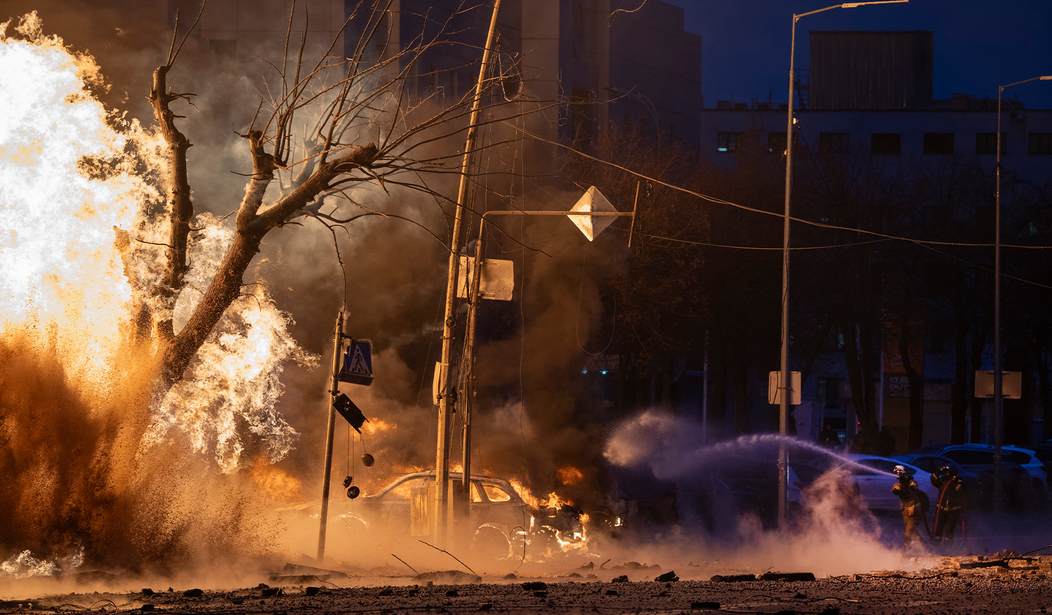Ukraine is in deep trouble. The Russian army is grinding away in a bloody war of attrition that can have only two outcomes: either a much-truncated nation following a peace treaty that would result in at least a quarter of Ukraine being given to the Russians or a surrender that would result in Russia's total takeover.
This is the grim reality that faces Ukraine and its European allies. Either prospect horrifies the Europeans. But they can't do anything about it. They have allowed their defenses to atrophy, their defense industries to wither, and the collective will to defend their way of life has turned to rot.
They didn't used to have to worry. The United States would protect them. Indeed, when Russia invaded Ukraine in February 2022, every Western politician got on his soapbox proclaiming solidarity with Kyiv, making promises about contributing to Ukraine's defense. Meanwhile, the politicians could barely bring themselves to sanction the bully in Moscow who received a shock when the Ukrainians actually fought back. They were certain that America would shoulder almost the entire burden of defending Ukraine because that's what America had always done.
Now, Donald Trump has become president, and they're worried. They're worried that Trump will actually force them to act in their collective self-defense by reducing or eliminating U.S. military aid to Kyiv It's enough to give the Germans, the French, and the Labour government in Great Britain the vapors.
Russian President Vladimir Putin saw this outcome from the start. He knew that all he had to do was keep grinding away at Ukraine's ever-diminishing army, bleeding it dry while the West would do everything possible to avoid the only real deterrent that would keep Ukraine from being overrun: NATO troops on the ground fighting Russian soldiers.
This is what President Volodymyr Zelenskyy has based his hopes on. He's known since the summer of 2023 that any thought of winning the war was gone after Ukraine's "offensive" failed to make much headway. He's now on a "charm offensive" hoping to weasel more money from Washington while claiming that he has a "plan" to win the war.
He doesn't. And now that Joe Biden's surrogate, Kamala Harris, has been defeated, Zelenskyy must face the prospect of relying on the Europeans to continue the war.
Good luck with that.
In some ways, this is more scary psychologically than in practice. Europe—which is to say, the democratic countries enmeshed in institutions such as NATO and the European Union—has the economic and technological resources to underwrite a serious defense effort. It has a large and educated enough population to staff modern armed forces. It also has some strong and growing military capabilities. For instance, European states either have received or will receive in the coming years as many as 600 F-35 fighters—the most advanced and capable aircraft in the world. Such a force could dominate the skies against a clearly inferior Russian opponent.
Yet Europe also has many weaknesses. It has developed a shockingly large number of military-hardware systems but then only builds a small number of each. This boutique way of addressing military capability has been exacerbated by a weakness in investing in logistics and a limited ability to produce supplies and equipment quickly and reliably enough to sustain a war effort.
Ramping up the production of weapons and defense systems will take years. Long before then, Ukraine will have made some kind of peace with Russia — forced or otherwise.
A possible alternative for Europe is to simply buy the guns, shells, and planes from the U.S. and give them to Ukraine. But the U.S., preparing for a war against China in the next decade, will be hard-pressed to turn over our limited defense industrial capacity to make weapons for someone else. The depleted stocks of missiles, shells, and other hardware we've given to Ukraine will take years to replenish.
Another alternative is to untie Ukraine's hands and allow them to use the long-range missiles and other weapons we're not letting them use now to hit Russia deep into its interior.
If the United States abandons Ukraine, European states can start taking steps that the Biden administration, in its excess of caution, did not allow. The four most powerful states in Europe today—the U.K., France, Germany, and Poland—could give Ukraine their blessing to attack any Russian military targets. After all, Russia is using its weapons—and those provided by its allies, such as Iran, to attack targets in Ukraine; the American refusal to let Ukraine use Western systems against military infrastructure in Russia itself makes no sense.
French President Emmanuel Macron asked this week, “The question we, as Europeans, must ask ourselves, is: Are we ready to defend the interests of Europeans?”
It's a little late in the day, Manny.
It's a question you should have asked 30 years ago after the fall of the Soviet Union. During the Cold War, it was America's nuclear umbrella that protected Europe. Then, the Europeans envisioned a war between the Soviets and the U.S. taking place as they watched the missiles pass over their heads.
They can't avoid it now. The United States will not send its young men and women to die on the battlefields of Ukraine when the Europeans aren't willing to send their young men and women to die on those same battlefields.










